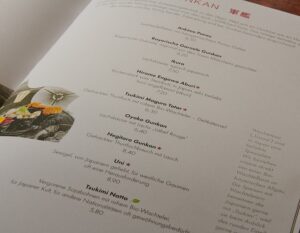There is always talk about the restaurant industry being a black money industry.
For many modern restaurateurs who try to run a business professionally and meet all legal requirements, this illegitimate blanket condemnation hurts their souls.
After all, running a food restaurant these days and thus being economically successful while at the same time offering high quality is an extreme economic tightrope walk, where the customer can never imagine how many costs and charges are incurred before the first plate is on the table.
And yet it seems that even today there is still black money in the restaurant business, not only somewhere in a vacation paradise, but also here with us, here in Munich.
Dieser Artikel entstand erstmals Anfang 2021, als die vollen Auswirkungen der Corona-Krise noch nicht vollends absehbar waren. Während dieser Krise hatten wir auch geschrieben über die Mehrwertsteuer und über die Sperrstunde in der Gastronomie während des letzten Lockdowns. All diese Sachen sind inzwischen scheinbar in Vergessenheit geraten, dass die damals groß angekündigten Hilfen später ganz anders umgesetzt und ausgelegt wurden, bekommt oft niemand mehr mit.
Gastronomy has a hard time in Germany
To say it in advance: We cannot "break the baton" over any restaurateur who rakes in black money.
This is because the additional costs are extremely high and the appreciation of food and gastronomy in Germany is literally low. We experience it ourselves time and again that even professional restaurant testers from the big, renowned guides mention restaurants that have a great ambience - but from our (well-founded Japanese, quality-oriented) point of view, the food is not worth the money.
Germany, and here apparently above all Munich, simply has a problem recognizing quality as such and not confusing it with ambience.
Fiscal built-in disadvantage for restaurants
And at the same time, for many years, taxation of food in restaurants at 19% made the catering industry a cash cow for the tax authorities: every piece of food purchased with 7% sales tax by the chef or end customer automatically had to be charged 19% sales tax in the restaurant. This was then contrasted by delivery services, which were booming even before Corona, and only had to pay 7%.
A comparison of prices has therefore resulted in a negative internal margin of a whopping 12% compared to retail prices for food or delivery services - no wonder restaurants have struggled to survive. In the long term, this tax disadvantage for restaurants should be permanently abolished. Incidentally, it is therefore also pointless for commentators on the internet today to suggest that there has only been one advantage for restaurants due to coronavirus: there has been a temporary abolition of a disadvantage, namely a 12% internal tax margin for the tax office compared to every private food buyer or delivery service.
Who pays taxes creates basis for his business
At the same time, one can also look at it this way: especially in times of Corona, we can be thankful that we have a well-organized and well-managed welfare state.
Every restaurateur also benefits from framework conditions created by the state. Ultimately, food safety, functioning roads for supply chains, unemployment benefits and short-time working benefits benefit all of us, including restaurateurs. All of this is also financed by taxes and duties.
And so the question of black money is then no longer just a question of control risks or of basic compliance with the law, but it is also a question of fairness towards the state (which is supposed to safeguard the foundations of the common good), towards other taxpayers and above all towards the restaurateurs themselves.
Because the one who earns black money or pays with black money has an illegal competitive advantage over the one who pays his taxes correctly and taxes his employees correctly.
Unintentional mistakes can happen quickly in the rule madness
Here, too, a caveat: the rules are so complicated today, the companies are subject to so many checks, mutual rule restrictions, that mistakes can always simply happen somewhere.
Especially in the Corona period, we have experienced a madness of subsidy conditions, short-time working conditions, state operating restrictions, special regional rules, etc., which at times even professionals (incl. tax consultants!) can hardly keep track of.
Add to this the "normal" working time laws, customer expectations, vacation and break regulations - and a small restaurant would theoretically have to employ one person full-time just to monitor and document the rules and keep track of them in the operational team!
Here, Germany is definitely over-regulated and the administrative authorities must also be aware of this, see it and sometimes react with a sense of proportion. And the restaurant business is traditionally an industry that is in the spotlight - little revenue, no reserves, but auditors who scrutinize every nook and cranny for possible errors. So you have to leave the church in the village somewhere.
Thus, a blanket classification of the restaurant industry as a black money industry is not appropriate, nor does it reflect the reality of today's world, even though the restaurant industry is considered a proverbial easy target for tax audits.
Deliberate fraud with criminal energy
But there is also deliberate fraud - and quite honestly, we are also blindsided when we realize how much better a business can apparently run when you work with black money. Two examples from practice:
Example #1: Black money distorts competition
Of course, the entire restaurant industry is in competition with each other for good employees.
As we are in the Restaurant sansaro actually only rely on Japanese employees, the market for us is even more limited. And all the more so because Japanese cuisine requires notoriously more preparation and therefore more staff than many other cuisines.
One day in 2019, we had a kitchen assistant who had been working for us as a temp. A so-called low-income job, i.e. (at the time) a maximum of 450 euros. The kitchen assistant worked well, but after a short time we received a problematic response based on her social security registration: she was apparently also registered elsewhere. We actually ask about this when hiring new staff, but the answers from employees here are not always entirely reliable.
As a result, we had to recalculate the net salary to be paid to this employee and make appropriate deductions. The job with us effectively became uninteresting for her, as there wasn't much left after tax. Somehow, the kitchen assistant even got the impression that we were to blame for this, because she could get a job elsewhere. She simply wasn't getting as much money out of us as she thought.
Because in another company that also makes sushi in the broadest sense (and wasn't that far away from us...), she was able to work her 20 hours a week at the same time (!) without any problems - and get exactly the money she had imagined.
There it was strangely possible to work in a second job without the taxation getting worse. Very clear statement at the time: what matters to her is how much she gets in cash, not whether the company is honorable enough to tax everything correctly.
With black money, doing business becomes much easier
A few years later, we meet an old business partner who is also peripherally involved with this restaurant. He says en passant: "Ah yes, they now have three stores and the boss now drives a Porsche". For us, an overall picture then comes together...
It can happen so quickly: from underdog with a sympathetic story in the newspaper to top earner in just a few years?
Now we may not care which boss drives which car - but instinctively one remembers how even in front of the last coffee shop sometimes the most expensive Mercedes or BMW SUV's are parked, while elsewhere one wonders how to earn one's money.
Because on average, a very simple employee who earns, for example, 1,440 euros net does not cost us 1,440 euros or 2,047 euros with employer charges. On average, we pay - using all permitted supplements with considerable administrative effort - 1.66 euros for every 1.00 euro we pay out to the employee.
It costs us far more. Because correct working also requires correct recording of hours. This results in certain break times, which in turn massively increases the effort required for duty roster creation and documentation.
This means that someone has to record the exact working hours, someone has to transfer the actual working hours to a suitable program, i.e. an internal administrative burden. This is followed by a rat's tail of other costs such as the employers' liability insurance association, payroll administration and so on, some of which are calculated on the basis of working hours and increase accordingly. And we haven't even included paid vacation yet. And that's the problem: many of the sensible, understandable, important rules and laws mean that in the already extremely labor-intensive and low-profit gastronomy sector, you actually have to employ administrative staff, pay them and calculate them in the menu prices, who ultimately don't work for the guest or serve or benefit them in any way. And this has a disproportionately high impact on small businesses in particular.
Without black money, ancillary costs and administrative expenses increase significantly
Things like the minimum wage and the Working Hours Act are good ideas, but they also lead to a sometimes absurd administrative burden that a small restaurant can only afford with considerable effort. This drives up costs - so it's no wonder that a business that takes a more relaxed view of all this has an easier time of it. And the workload here is also higher because the working hours are never really the same as in an office job. Customers come in at different times, more or less, in a restaurant all hands have to be on deck, and there are no resources for administrative tasks (which restaurateurs are required to do by law, especially due to public holidays and night work, etc.).
But what hurts us: this described company will also look more and more attractive for most employees. Because everything is less complicated, everything is easier, much less pressure on the system. And we know that the same practice is still being followed in the company years later.
And we have never seen a guest who says he likes to come to us because we keep correct time sheets every month and because we pay attention to a duty roster in which the maximum weekly working hours are somehow adhered to even when customer frequency changes. By the way, the high density of regulations is pushing the catering industry in the direction of system catering, but that's another topic...
Example #2: the gold mine
Case 2: a restaurant in Munich, very close to example #1, which, funnily enough, also runs a snack bar. Through a chain of interesting circumstances, which we will relate on occasion, we gain an intimate insight behind the scenes of this restaurant.
We are shocked by the hygiene situation and other things - but it is also understandable that the employees there see things very differently to us, as they are chronically overworked and have actual working hours that violate every working hours law. After all, at some point you become blind to the business and surviving in the catering industry is not easy for anyone, especially if the business is hopelessly understaffed, as we know from years of contact.
But we are really shocked by our visit to the adjacent snack bar: while we are there, the cash register, which is always open, is almost never operated. All the alarm bells are ringing: haven't we just read in the Süddeutsche and other newspapers long Tirades about Bonpflicht and that the catering industry needs to be audited more closely because it often cheats? Wouldn't an auditor have to see through what's going on right away on the first visit? Didn't we just hear about a renowned Japanese restaurant in Munich that was just surrounded and inspected by customs and police while it was in operation?
Tricking the examiner becomes a sport
No, one of the employees tells us. One does this very cleverly and pays attention to whether any "atypical guests" are in the queue. One tells the auditor one thing and does another, for example in the question of how much empty packaging is purchased and how much packaging is given out per guest & meal and so on. With an elaborate system, the actual working hours would be disguised, so that half of the staff would officially work as 450 Euro employees, but actually work full time. Otherwise it wouldn't be worth it, because everyone would have several jobs - so again a similar case to the other restaurant.
And in general, there is a lady in the office who does an absolutely brilliant job when someone comes from the KVR or the tax office. The woman is amazing, she wraps up everyone. The interlocking of preparatory accounting and snack runs perfectly.
The employees there proudly tell us how ingeniously everything runs, what kind of wild stories were made in the past. Hours of work that were billed as artistic appearances via invoices for events, bundles of money that were always taken out for the owner by friends - all apparently no problem if you do it right.
And we can understand it: the lady in the office tells us similar things and stories about how she had to "secure" the black money from her bosses in order to use it for the company, i.e. to supplement the employees' salaries, including her own of course, with black money every month.
In the course of the conversation, we realize that the lady has been washed by all means and has built up her own little empire. Not all black money is apparently used for a Porsche (or, as in this case, a BMW Mini that was supposedly won) - sometimes it seems to be a bare necessity for the survival of a business. Or to secure the office lady a sensationally paid part-time job that other restaurateurs can only dream of...
Where people work with black money, they also like to use cheap material?
Our ideas about correct taxation, high-quality materials, etc. seem like a total anachronism there. If meat is missing, it is quickly bought cheaply at the discount store. The employees proudly tell us that they do all this quickly in working hours that are not officially recorded, but are already covered by the black money.
We shudder just thinking about buying cheap meat for our guests. Well, for a snack bar that wants to be as cheap as possible, it may work to buy material in this way. Competition is tough and you have to adapt to your customers. But consciously taking criminal risks such as illegal money or fraudulent working hours would be unthinkable for us, and buying poor quality is simply not an option for us.
But it seems to be paying off: "The (restaurant name) is a goldmine - if you do it right!", the lady in charge at the office keeps telling us. In the course of time, we have the impression that employees and bosses have built up a lucrative system there, which may even have financed the villa in Italy or Thailand...
Tricking the auditor seemed almost like a sport to us in this operation - a sport that is certainly more fun than the arduous marathon of keeping all possible records as accurate as possible and actually aligning the restaurant's processes with them.
Black money less complicated and more positive for employees
And of course, working in such a restaurant is also much, much easier: no precise recording of working hours, means no discussion for the employee about why he can't record his breaks as working time (sic!). Because in the end it doesn't matter when and how much he works - as long as it suits him and somehow seems to suit the boss.
Any salary discussion with a leading employee becomes significantly easier. You want 100 euros more net? Okay, you get 100 euros more or not. Elsewhere it means: You want 100 euros more? That's a cost increase of about 250 euros for executives - "only" 100 euros doesn't exist. Because with higher salaries the additional costs increase progressively, of course.
In such a company, many employees feel much more comfortable - especially if they do not have to pay money from their pay slips to their ex-wife, who of course does not see any of the black money...
The operator and the employees obviously have a much more relaxed life and a much easier gastronomic survival thanks to creative cash flows. And by the time the tax office gets wise to such people, they're long gone.
The one who wants to work correctly remains the stupid one.
The guest has it in his hands!
For the guest everything remains the same: the service will serve him well. He, the guest, goes where he feels welcome and where his respective expectations of cleanliness, ambience, taste, etc. are met. at least in appearance be fulfilled.
The guest doesn't see whether work is done this way or that behind the scenes - nor does he need to be interested, per se. No one has to force this issue on him, he should have a good time and enjoy his meal and decide where he wants to go. It is the task of the authorities to control compliance with the law and to enforce it.
But in terms of fairness, competitive equality, and overall fiscal equity, it's a critical difference. And even a few bad apples spoil the basket, have an impact on the industry. Because employees see the advantage for themselves where they can get the most out and work the easiest. Guests feel more comfortable where they have to pay less or the operator has more money left for great ambience.
And anyway: would you rather trust a restaurant where the boss drives a Porsche - or one where the boss comes along in a rusty old clunker?






